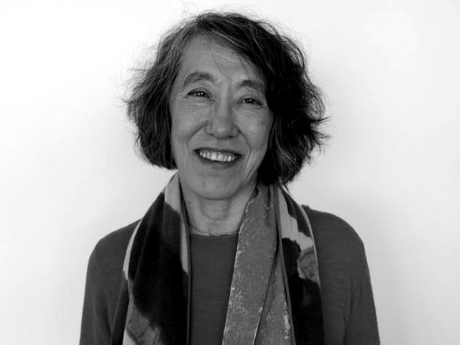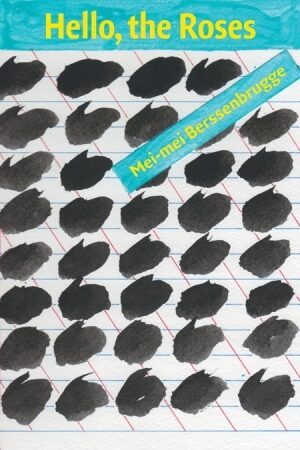In Their Own Words
Mei-mei Berssenbrugge's “Hello, the Roses”

Hello, the Roses
1
My soul radially whorls out to the edges of my body, according to the same laws
by which stars shine, communicating with my body by emanation.
When you see her, you feel the impact of what visual can mean.
Invisibility comes through of deep pink or a color I see clairvoyantly.
This felt sense at seeing the rose extends, because light in the DNA of my cells
receives light frequencies of the flower as a hologram.
The entire rose, petals in moving air, emotion of perfume records as a sphere, so
when I recall the emotion, I touch dimensionality.
From a small bud emerges a tight wound bundle of babyskin coral petals, held in
a half globe, as if by cupped hands.
Then, petals are innumerable, loose, double, sumptuous, unified.
I look through parted fingers to soften my gaze, and slow light shining off the
object is filtered, and then with feeling I look at swift color there.
It's swiftness that seems still as noon light, because my seeing travels at the same
speed.
I make a reciprocal balance between light falling on the back of my eye to optic
nerve to pineal gland, radiance stepping down to matter, and my future self
opening out from this sight.
A moment extends to time passing as sense impression of a rose, including new
joys where imagined roses, roses I haven't yet seen or seen in books record as my
experience.
Then experience is revelation, because plants and people have in their cells
particles of light that can become coherent, that radiate out physically and also
with the creativity of metaphor, as in a beam of light holographically, i.e. by
intuition, in which I inhale the perfume of the Bourbon rose, then try to separate
what is scent, sense, and what you call memory, what is emotion, where in a
dialogue like touching is it so vibratory and so absorbent of my attention and
longing, with impressions like fingerprints all over.
I'm saying physical perception is the data of my embodiment, whereas for the
rose, scarlet itself is matter.
2
The rose communicates instantly with the woman by sight, collapsing its
boundaries, and the woman widens her boundaries.
Her "rate of perception" slows down, because of its complexity.
There's a feeling of touching and being touched, the shadings of color she can sense
from touch.
There's an affinity between awareness and blossom.
The rose symbolizes the light of this self-affinity.
I come to visit drooping white cabbage roses at dusk.
That corner of the garden glows with a quality of light I might see when light
shines through mist or in early morning, reflects off water.
I stand quietly and allow this quality to permeate air around me.
Here, with a white rose, color is clairsentient, this color in the process of being
expressed, like seeing Venus in the day.
Walking, I move in and out of negative space around which each rose is engaged
and become uncertain of my physical extent as an object.
Look at the energy between people and plants; your heart moves into depth
perception; for depth, read speed of light.
I set my intention through this sense of moving into coherence with the bio-photons
of a plant and generate feeling in response.
A space opens and awareness gathers it in, as at night my dream is colorless and
weaves into the nuance.
I can intentionally engage with the coherence of light beams, instant as though
lightless, or the colored light of a dimension not yet arrived, as our hearts are not
outside affinity with respect to wavelength, shaping meaning, using the capacity
for feeling to sense its potency in a rose and to cultivate inter-being with summer
perfume.
From Hello, the Roses (New Directions, 2013). All rights reserved. Reprinted with the permission of the author.
On "Hello, the Roses"
For a few years, I've been writing poems in which I use the natural environment as a force field and I try to receive frequencies, intuitions, from natural beauty to fuel and form a poem, in the same way radio waves and microwaves and light waves in the atmosphere carry content and meaning.
When I began to read about communicating with plants, I was curious about the "coincidence" that a human illness could be alleviated by a plant, sometimes by a plant from far away, from a rainforest or high plateau.
I walk every day from the mesa where I live in New Mexico, and I may notice a plant because of its beautiful seedpods or the way it shines out with the light behind it. The plant is calling me. I begin to think about this plant, and I walk by it several times. I sit next to it. I try to open my heart to the plant. The dry streambed becomes quiet and more vivid. I can hear a bird's wings through the air. I try to feel the embeddedness of all living things with each other, and I try to catch the words that are passing through my mind, and as days pass, I realize they come from my plant. I've read that plants are compassionate, and that they are connected by vast mycelial networks underground and by the exquisite receptivity and responsiveness of their chemistries.
There is a trans-dimensional blend of human and divine or transcendental elements around me. A person can be brought up to think of a mountain as a spirit, a cardinal
point, or to think of it as inert rock. She may read unique information encoded in the fractalized dimensional ridgeline of a mountain, the crimson edge of a petal.
I try to write as if time were simultaneous and consecutive at once, and even simultaneous with the future. Each moment or event projects one line, and you can move from one strand to another, or "pluck" one strand to resonate with the one you occupy now. I think of our sense of passing time or consecution as a perceptual device perhaps like depth perception.
I think we're born with the capacity for sensing emotional nuance around us. Not only of beloved persons nearby, but of people we don't know—globally—and also of animals, plants, clouds, rocks. We can perceive a kind of ur-nuance or oversoul of the situation as a whole in present time, and also feel it radiating into the future and back to the past by walking through woods, on the desert or in a garden.



